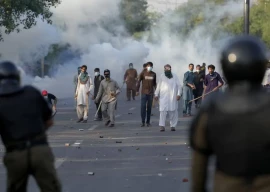
With law enforcement too weak to fight the violence sparked by online campaigns, activists want giant internet firms to roll out greater protection for users, from streamlining how they tackle complaints to faster action against threats of violence.

“These technologies are helping to increase violence against women, not just mirroring it,” said Gul Bukhari of Bytes for All, and the author of a report released this week as Pakistan experiences a surge in sectarian hatred, attacks on minorities and blasphemy quarrels. “A lot of the crime we are witnessing would not have been possible without the use of these technologies.”
There have been more than 170 complaints of cybercrime against women this year in Punjab, the Federal Investigation Agency says. No figures were available for the remaining three provinces. None of the cases was successfully prosecuted because women usually reached a compromise with the suspect, said Syed Shahid Hassan, an official with the cybercrime office in Lahore, where 30 employees work full-time.
Since police rarely act when women are harassed online, few cases are reported, activists say. About 32 million of Pakistan’s 180 million people use the Internet, the group said in its report, mainly on mobile telephones. About 12 million are on Facebook and some 2 million use Twitter, domestic media say.
In one case documented by Bytes for All, an online hate campaign last year urging the rape and murder of a prominent human rights defender culminated in shots being fired at the woman and her husband. She received hundreds of threats and the addresses of her family were posted online, along with pictures of her and her daughter.
“She suffered nightmares of being raped, of family members being harmed because of her,” the group said. Facebook took down the pages, but had to do so again when they were posted by a different user, the group said, and Twitter took a month to deal with her complaint. Twitter declined to comment on specific cases but says it took tough steps last year to protect privacy and tackle abuse.
Blackmailed into rape
In another case that spotlights the limitations of police, a 14-year-old girl was blackmailed into submitting to repeated gang rapes after her boyfriend threatened to post online a video he had secretly shot of the two together.
The slight, shy girl told Reuters she was too ashamed to tell her family and gave into her abuser’s demands. Bukhari’s investigation showed police got the girl’s age wrong and did not charge her abusers with statutory rape.
“She’s 18,” one police officer told Reuters, but admitted he had not looked at school records to ascertain her age or searched for evidence of the abuse online. Though the case is nearly two years old, authorities have not asked Facebook for evidence, the girl’s lawyer said.
Published in The Express Tribune, October 1st, 2014.






























1714024018-0/ModiLara-(1)1714024018-0-270x192.webp)










COMMENTS
Comments are moderated and generally will be posted if they are on-topic and not abusive.
For more information, please see our Comments FAQ